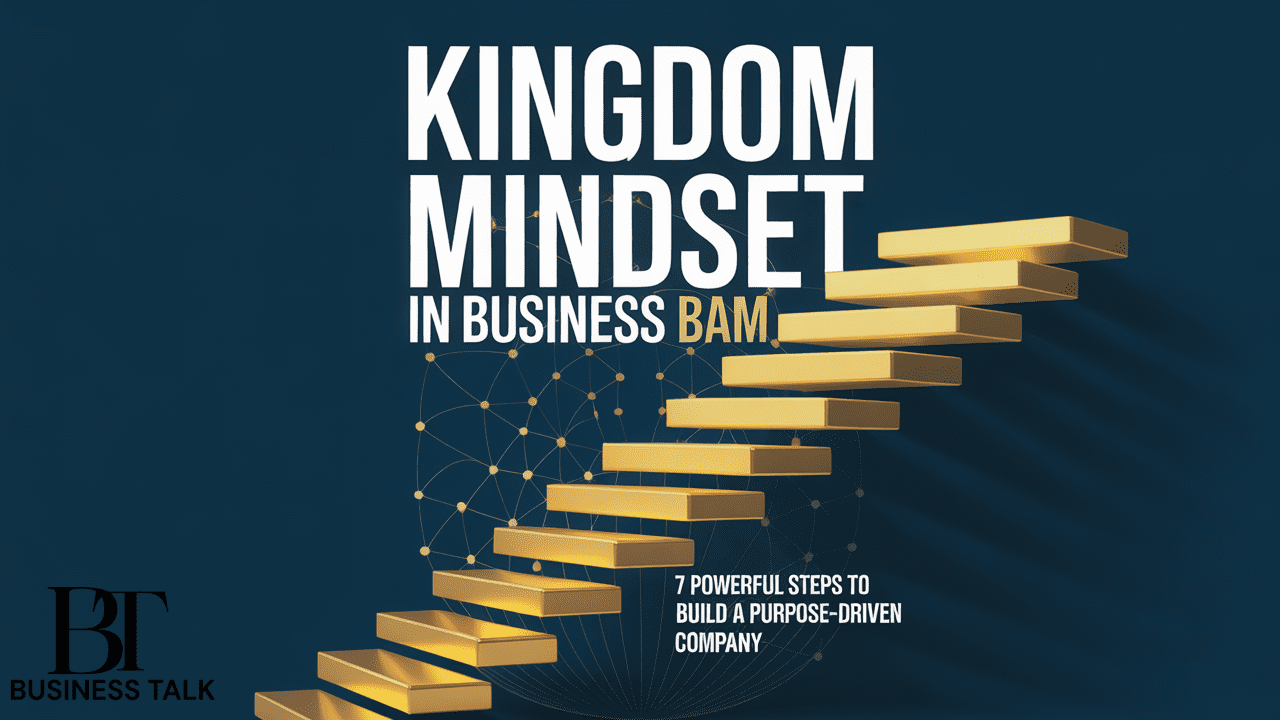In today’s competitive corporate world, entrepreneurs and executives are looking beyond mere profit to build companies grounded in purpose, values, and faith. The concept of a kingdom mindset in business BAM (Business as Mission) is gaining momentum among Christian business leaders in the United States. It represents a transformative approach that integrates biblical principles, ethical leadership, and spiritual growth into modern entrepreneurship.
Having a kingdom mindset in business BAM means viewing your enterprise not just as a profit-making machine but as a divine platform for impact. This perspective emphasizes stewardship over ownership, service over self-interest, and eternal impact over temporary gains. In a marketplace often driven by competition and greed, adopting this mindset helps leaders cultivate authenticity, resilience, and compassion.
Understanding the Kingdom Mindset in Business BAM
At its core, the kingdom mindset in business BAM is rooted in the idea that business is a calling, not just a career. Entrepreneurs who embrace this belief see their ventures as tools for transformation—both economically and spiritually.
Business as Mission (BAM) is an approach that aligns economic activity with spiritual objectives. It encourages Christians to use business as a way to serve communities, create jobs, and share ethical values inspired by faith. Unlike traditional business models that prioritize profit above all else, BAM emphasizes holistic success, where spiritual growth and social impact are as important as financial returns.
Dr. Ken Eldred, an influential author and advocate of BAM, once said,
“A kingdom business exists to glorify God in all aspects—by serving people, producing excellent products, and promoting righteousness in the marketplace.”
This perspective underscores the belief that faith-driven entrepreneurship can transform not just businesses but entire societies when done with integrity and divine purpose.
The Core Principles of a Kingdom Mindset
Purpose Over Profit
A kingdom mindset prioritizes God’s purpose above financial outcomes. Leaders make decisions based on prayer, wisdom, and moral conviction rather than greed or pressure. Profit is seen as a tool for greater good, enabling expansion of social programs, community aid, or missionary work.
Stewardship Over Ownership
Those who adopt this mindset recognize that their business ultimately belongs to God. They see themselves as stewards, entrusted to manage resources responsibly. This principle fosters humility and accountability, encouraging leaders to operate transparently and justly.
Service Over Self
In a kingdom business, success is defined not by personal achievement but by how well one serves others. This service-oriented approach builds trust, loyalty, and long-term sustainability—values often lacking in traditional corporate cultures.
Transformation Through Ethics
BAM entrepreneurs integrate Christian ethics into every layer of their operation. From employee relations to environmental responsibility, their decisions reflect moral integrity. This approach builds credibility and enhances brand reputation.
Why the Kingdom Mindset Matters in Modern Business
The American business landscape is evolving. Consumers today expect more than just products—they seek authenticity, social responsibility, and ethical leadership. The kingdom mindset in business BAM answers this call by offering a model that unites profitability with purpose.
Faith-driven entrepreneurs are increasingly using their influence to fight injustice, support fair trade, and promote sustainability. They create businesses that empower communities and reflect God’s values in tangible ways.
Moreover, adopting this mindset can lead to measurable benefits, including:
- Enhanced employee engagement: When staff members see that their company operates with moral integrity, they feel more motivated and committed.
- Stronger customer loyalty: Consumers trust brands that stand for honesty, compassion, and social responsibility.
- Sustainable growth: Businesses built on ethical foundations tend to thrive long-term, even in volatile markets.
Integrating BAM Principles Into Everyday Business Practices
Transitioning to a kingdom mindset requires both internal transformation and external action. Here’s how entrepreneurs can practically integrate these principles:
Define a God-Centered Mission
Start by identifying how your business can glorify God while meeting customer needs. Craft a mission statement that aligns with faith-driven values, ensuring every strategy reflects divine purpose.
Lead With Integrity
Honesty and transparency are non-negotiable. Upholding ethical standards in hiring, marketing, and partnerships builds credibility.
Foster Community Impact
Use profits and resources to uplift local communities. Whether through job creation or social projects, focus on empowerment rather than charity.
Practice Faith in the Workplace
Create spaces for prayer, mentorship, and personal growth. Encouraging faith-based discussions helps employees connect their work with deeper meaning.
Measure Success Differently
Instead of tracking only financial metrics, evaluate spiritual growth, employee well-being, and community transformation.
The Spiritual and Economic Impact of BAM
Businesses operating under BAM principles have been shown to strengthen local economies, create sustainable employment, and reduce poverty. Research published in The Journal of Biblical Integration in Business highlights that companies embracing faith-based ethics often report higher employee satisfaction and lower turnover rates.
From a spiritual standpoint, these businesses serve as living testimonies of God’s grace. They show that faith is not confined to church walls but thrives in boardrooms, factories, and shops.
Expert Perspectives on Kingdom Business
Experts emphasize that BAM is not about evangelism through coercion but living out Christian values naturally within the marketplace. Dr. Michael Baer, author of Business as Mission: The Power of Business in the Kingdom of God, explains:
“When business leaders apply biblical principles with excellence and humility, they demonstrate the kingdom of God through action, not words.”
Such integration of faith and commerce not only glorifies God but also brings profound meaning to the entrepreneur’s journey.
Overcoming Challenges in Living the Kingdom Mindset
While inspiring, the path toward a kingdom mindset in business BAM is not without difficulties. Entrepreneurs may face skepticism, market resistance, or financial constraints. Balancing faith and profit requires discernment, resilience, and prayerful decision-making.
However, those who persevere often experience deeper satisfaction and greater influence. By trusting in God’s timing and maintaining integrity, leaders can navigate challenges while staying true to their mission.
Building a Legacy Through Kingdom Entrepreneurship
The ultimate goal of a kingdom mindset is legacy. It’s about building something that outlasts financial success—an enterprise that changes lives and glorifies God. Entrepreneurs who adopt this mindset become agents of transformation, shaping culture through compassion, fairness, and faith.
Their companies stand as examples that profit and purpose can coexist, and that success rooted in spiritual values is both sustainable and deeply fulfilling.
Conclusion
The kingdom mindset in business BAM offers a radical yet timeless approach to entrepreneurship. It invites leaders to view their ventures as missions—platforms to express faith, impact society, and honor God.
By embracing stewardship, service, and integrity, Christian entrepreneurs can redefine what it means to succeed in the modern world. The future of business lies not just in innovation and profit but in purpose, humility, and divine guidance.
As we move forward, adopting this mindset will empower more leaders to build companies that are not only profitable but righteous, resilient, and eternally impactful.






Pingback: Application Mobile DualMedia: 7 Powerful Features Enhancing Mobile Experiences